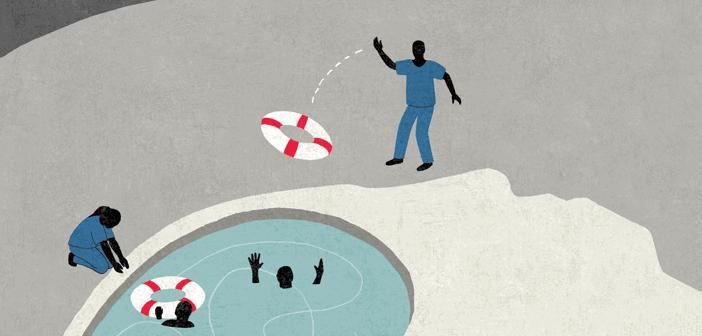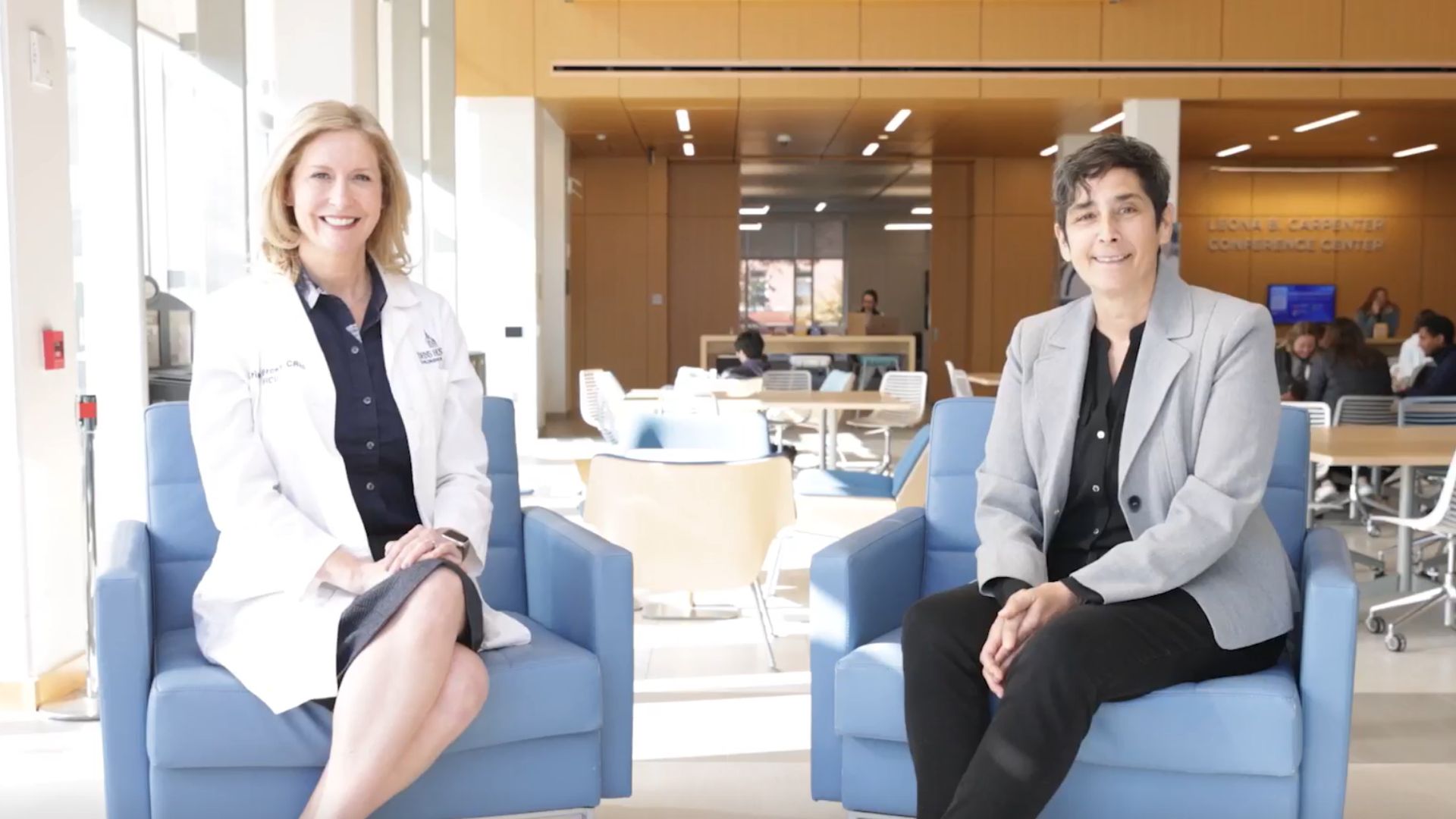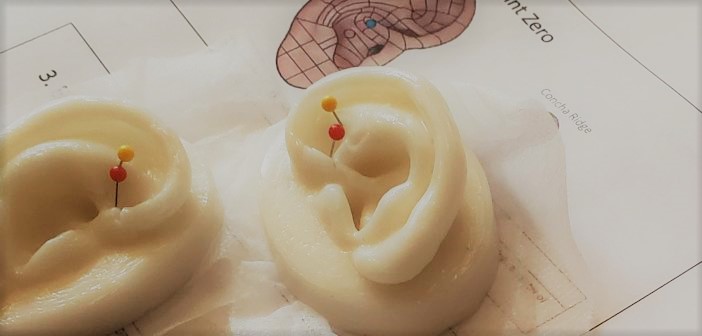Nurses prepare a safety net at the precipice of a mental healthcare crisis
Imagine being one of the tens of millions of people in America who have lived for years without health coverage or access to care outside of emergency room visits, one of those who struggled to manage everyday life while coping with an untreated mental health or substance abuse condition. Imagine ringing in the new year by enrolling in a healthcare plan, perhaps for the first time ever, through HealthCare. gov’s online marketplace. Finally, there’s a light at the end of that long, dark tunnel. Or is there?
For the mental healthcare community, the influx of newly insured people seeking services puts the spotlight on a challenge that long preceded the Affordable Care Act: a huge population of patients with mental health needs and a shortage of psychiatrists and other qualified professionals to treat them. It’s a complex challenge without a single solution, but it’s also an opportunity for nurses to emerge as leaders in helping to bridge that gap. At the Johns Hopkins School of Nursing (JHSON), faculty and researchers are doing just that, enhancing the role of the nurse in psychiatric care, and creating more nurses who can fill it.
The 2010 U.S. National Survey on Drug and Health estimated that 46 million adults in the United States suffered from mental disorders but only 40 percent had received treatment in the previous year. Further, the Jonas Center for Nursing Excellence stated that in 2013, there were 90 million Americans in federally designated Mental Health Professional Shortage Areas. With HealthCare.gov now live, as many as 10 million more people will have coverage for mental health and substance abuse issues. Complicating matters are the many intertwined needs of that population. Specialized assessments and treatments are required for geriatric, pediatric, and military veteran patients. Many require treatment for medical issues in addition to psychiatric or substance abuse issues. Pharmaceutical treatments can bring side effects that then need to be managed as well.
Linda Gerson, PhD, RN, researcher and assistant professor in the Department of Acute and Chronic Care, calls the psychiatric nurse a lynchpin in the patient’s mental healthcare team and support network, one that includes family members and community. “Nurses who are providing psychiatric care are considering the whole patient, including physical, emotional, and social needs,” she says. “The mentally ill are a complex group to care for. We spend a lot of time trying to educate our patients and help them live on a daily basis.”
Gerson designed a study to assess the needs of the chronically mentally ill—and their families—to seek ways in which nurses could help reduce readmissions and smooth the transition from hospital to home. In addition to medication management, she cites a need to help patients connect with social support and assist families in finding support resources for themselves.
“Unless they’re already involved with a local organization, they may have trouble finding ongoing resources or aid,” she explains.
Social Stigma
Deborah Gross, DNSc, RN, professor and chair in Mental Health and Psychiatric Nursing, points out that even with insurance, parents may have difficulty finding affordable care for children with behavioral problems. And many fear that a psychiatric diagnosis could label their child for life.
That same worry over the social stigma not only prevents many people suffering with mental health issues from seeking care in the first place but makes the transition from hospitalization back to the community more difficult. Gerson feels it’s important to introduce her nursing students to groups that are working within communities, groups like the National Alliance on Mental Illness (NAMI) and other mental health organizations.. An upcoming luncheon at the School will bring together students with participants in the American Foundation for Suicide Prevention’s Out of the Darkness walks, events that promote public awareness of depression and suicide, to talk about ways to reinforce each other’s work.
Gross, meanwhile, works with Baltimore schools on implementing her Chicago Parent Program, a skills and support effort that helps parents of 2- to 5-year-old children who have or are at risk for behavioral problems. (Gross launched the program in Chicago before joining JHSON.) She believes parents may be more likely to seek help for troubled children when preventative or health promotion services can be found in schools or other non-stigmatized community settings. Early intervention is key. “If you don’t treat problems early, they build on each other. There’s so much that we as nurses can do to change that trajectory in those first five years by working with parents. And when you can help the parents, you’re not just helping one child— you’re helping all their children.”
[pullquote]
People are going to go where they’re comfortable, which
usually means their primary care provider. Instead of
having them shuttle between healthcare systems, we want
to have nurse practitioners who can provide integrated care
for physical, social, and mental health across a range of
settings and services. The focus on integrated care is new
and relevant to the healthcare system today.
– Karan Kverno, PhD, PMHCNS-BC, PMHNP-BC
[/pullquote]
The Provider Pool
In Maryland alone, there are over 700,000 residents without access to the mental health services they need, primarily in rural areas of the state. In response, Karan Kverno, PhD, PMHCNS-BC, PMHNP-BC, and Deborah Finnell, DNS, PMHNP-BC, CARN-AP, spearheaded the Psychiatric Mental Health Nurse Practitioner certificate program, a one-year, post-master’s intensive for primary care nurse practitioners that will prepare NPs to provide integrated mental healthcare services, including assessment and prescriptions.
Designed as an online course, it will include clinical training partnerships with facilities in underserved areas of Maryland where the students are located. The priority is to keep NPs in those areas, providing much-needed services while they earn the certificate. All core courses are completed in the first semester, followed by two semesters of practice.
“People are going to go where they’re comfortable,” says Kverno, “which usually means their primary care provider. Instead of having them shuttle between healthcare systems, we want to have nurse practitioners who can provide integrated care for physical, social, and mental health across a range of settings and services. The focus on integrated care is new and relevant to the healthcare system today.”
The curriculum launches in May with 10 students in its first cohort and an anticipated 15 per year after that. “There will be considerable interaction between faculty and students,” says Finnell. “We have developed the curriculum so that we can really personalize the experience and tailor it to the students’ needs.” JHSON is one of the first nursing schools to use this kind of intensive online instruction to train nurse practitioners in integrative mental healthcare.
Nurse-Driven Research
Since her arrival at Hopkins in 2008, Gross has met monthly with psychiatric nurse clinicians to talk through questions addressing quality of care and managing costs. With her advice and guidance, groups of nurses design studies that lead to evidence-based practices. Projects on which she’s helped include evaluating the reduced use of restraints and seclusions on psychiatric patients.
“It’s been so interesting,” she says. “Nurses are wonderful observers and really natural scientists. They’re always looking for ways to improve processes and fix problems at the bedside. There’s a lot that nursing care can do that improves outcomes and decreases costs, and the way you find that out is through these research projects.”
Gerson likewise works with her students to develop skills in gathering evidence—evaluating the existing research as well as learning to develop studies of their own where the literature is slim. “We have to design models of care that will address the needs of patients and their families. There isn’t a lot of literature on nursing intervention in this process, but nursing is critical to breaking the cycle of hospitalization. We need to do that research to support our interventions. We build credibility when we build evidence for our nursing actions.”

A Common Goal
Few would suggest that psychiatric nursing is a replacement for physician care, or that nursing alone can fill the demand for mental healthcare services. However, by identifying areas where nurses are poised to contribute more to the delivery and continuity of care, Hopkins keeps pace with the national and global recommendations for the role of nurses in healthcare reform such as those endorsed by the World Health Organization and the Substance Abuse and Mental Health Services Administration.
“Mental healthcare is crucial to the well-being of society,” says Gerson. “In light of the Affordable Care Act, we as nurses have an obligation to carve out our role, to look at how we can inform health policy, to understand how we’re going to best serve the needs of our patients. To me, this is not in isolation but as part of an interprofessional team. Together, we will be able to improve the patient’s quality of life.”

 From Health at Home to ICU, Pediatric Nurse Practitioners Talk About the Care Continuum
From Health at Home to ICU, Pediatric Nurse Practitioners Talk About the Care Continuum Team Captain
Team Captain ‘Well-Rounded’ DNP Student Comes Full Circle
‘Well-Rounded’ DNP Student Comes Full Circle Can inpatient nurses use auricular point acupressure to help oncology patients manage pain?
Can inpatient nurses use auricular point acupressure to help oncology patients manage pain? Podcast with Deborah Gross, Discusses Chicago Parent Program
Podcast with Deborah Gross, Discusses Chicago Parent Program







